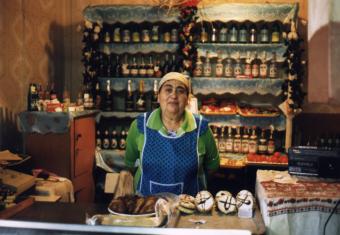 |
HERR ZWILLING UND
FRAU ZUCKERMANN
Mr. Zwilling
and Mrs. Zuckermann
Volker Koepp
Deutschland 1999
Produktion: Vineta
Film, MDR, WDR, SFB Weltvertrieb: First Hand Films Bahnhofstr. 21, 8180
Bülach, Schweiz
Tel. (41-18) 622 106, Fax 622 146
Buch:
Volker Koepp, Barbara Frankenstein Kamera: Thomas Plenert
Kamera-Assistenz: Lars Lenski, Michael Loewenberg
Ton: Uve Haußig
Mischung: Hartmut Eichgrün
Schnitt: Angelika Arnold
Sprachen: Deutsch, Hebräisch, Jiddisch, Russisch, Ukrainisch
Format:
35mm, 1:1.66, Farbe Länge: 126 Minuten, 24 B/sek. |
| Im
Westen der Ukraine, unweit der Grenze zu Rumänien, eine entlegene
europäische Stadt: Czernowitz. Einst Zentrum jüdischer Kultur
in der Bukowina, einer Grenzlandschaft, die über die Jahrhunderte
vom Vielvölkergemisch geprägt war. Es war eine Gegend, in der
Menschen und Bücher lebten, sagte der Dichter Paul Celan über
die versunkene Welt seiner Jugend, die nur in der Literatur und in der
Erinnerung über Zeiten hinweg lebendig bleibt. Zeiten der Auswanderung,
Vertreibung und Vernichtung der Juden. In Czernowitz, wo die jüdische
Bevölkerung zeitweilig die Hälfte der Einwohner ausmachte, überlebten
nur wenige die von Deutschen und Rumänen 1941 verordnete Deportation
in die Lager Transnistriens. Im Mittelpunkt des Films stehen Herr Zwilling
und Frau Zuckermann, die zu den letzten noch im alten Czernowitz geborenen
Juden gehören. Beide verbindet neben ihrer Freundschaft nicht zuletzt
die deutsche Sprache. Täglich besucht Herr Zwilling in den Abendstunden
die 90jährige Frau Zuckermann. Man spricht über frühere
Zeiten, das gemeinsam Erlebte, über Politik und Literatur und die
alltäglichen Sorgen. In den Lebensgeschichten dieser beiden Menschen
steckt das Elend dieses Jahrhunderts. Mit ihren Erinnerungen verknüpft
der Film Episoden aus dem jüdischen Leben im heutigen Czernowitz,
das sich mit Ende der Sowjetunion erstmalig wieder regt. |
In the west of Ukraine, not
far from the border to Romania, there is a faraway European city: Czernowitz.
It was once the centre of Jewish culture in the Bukowina, a border area
characterized over centuries by a multi-cultural mixture of peoples.
Here, Ukrainians, Poles, Romanians, Germans and Jews lived side by side.
Jewish schtetls dotted the countryside of Galicia. Until World War I,
Czernowitz belonged to Austria-Hungary, then it became part of Romania,
after the Hitler-Stalin pact it was part of the Soviet Union, then the
Romanians returned together with the Germans, afterwards it belonged
to the Soviet Union again. ‘It is a region where people and books
used to live’, the poet Paul Celan once said about the lost world
of his youth which continues to exist only in literature and in memory.
Emigration, expulsion and destruction of the Jews. In Czernowitz, where
temporarily half the population was Jewish, only a few survived deportations
into Transnistria’s camps ordered by the Germans and Romanians
in 1941. Volker Koepp’s film focuses on Mr. Zwilling and Mrs. Zuckermann,
two of the last few Jews born in the old Czernowitz. They share a friendship
but also their love for the German language. Mr. Zwilling visits 90-year-old
Mrs. Zuckermann daily in the early hours of the evening. They talk about
old times, about shared events, about politics and literature and the
worries of everyday life. The life story of these two people contains
all the miseries of this century. The film combines their memories and
episodes from Jewish life in contemporary Czernowitz, which is beginning
to revive since the Soviet Union ceased to exist.
|